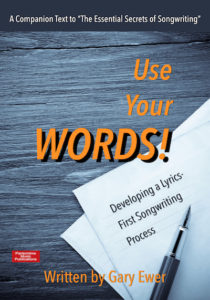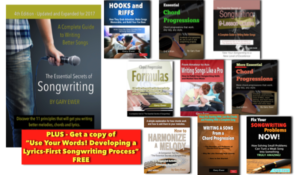 Don’t miss out on a free copy of “Use Your Words! Developing a Lyrics-First Songwriting Process.” It’s free when you purchase “The Essential Secrets of Songwriting 10-eBook Bundle”
Don’t miss out on a free copy of “Use Your Words! Developing a Lyrics-First Songwriting Process.” It’s free when you purchase “The Essential Secrets of Songwriting 10-eBook Bundle”
If you like writing complex lyrics, where the meaning isn’t likely to be immediately obvious to your audience, you’ve got one main problem to overcome: to stimulate the imagination of your listeners without overly frustrating them.
Here’s another way to say it: a complicated lyric needs to offer the possibility or hope to a listener that they can eventually understand it on some level.
To not offer that hope means you might have just written garbage.
First, three things about complex lyrics:
- There’s no requirement on your part that anyone eventually understand what you had in mind with your lyric. They may only have a theory as to what you meant by your lyric, and that’s fair enough.
- Lyrics with no meaning are self-indulgent and pretentious. You can send people down paths trying to understand what you wrote, with you knowing that there was no particular meaning or message to find.
- A complex lyric holds the possibility of deeper meaning, and eventual deeper understanding on the part of the listener. Usually it’s why a lyricist might write a complex lyric in the first place. As listeners come up with theories regarding its meaning, they’ll test their theory line-by-line. Once they’re convinced they truly understand the lyric (and even if they aren’t “right”), they find that the lyric is greater than the sum of its parts.
About point #2: In “Come Together,” John Lennon purposely wrote confusing lyrics with little to no meaning (in the traditional sense of the word.) He was trying to make a point, that people often look for meaning where there isn’t any. So that song doesn’t really rate as “self-indulgent” in the sense intended here.
How Complexity Works
How does a complex lyric work, and what makes it enticing? One word: emotion. You’ll notice that a song lyric where the meaning isn’t clear still has the ability to emotionally connect to the listener.
Without that emotional draw, listeners will feel disconnected and ultimately bored. A complex lyric can’t just be an intellectual exercise; it still has the responsibility to attempt to create an emotional response.
Another Beatles song, “You Never Give Me Your Money“, from “Abbey Road”, can serve as a good example here.
It’s not complex in the sense that we can’t tell what’s going on; it’s more a case that we’re not immediately sure exactly what the full meaning might be. We’re not likely to know, at least not right away, what McCartney was referring to by “funny paper”, “middle of investigation”, “middle of negotiations”, and so on.
After a few listens, we get a clearer picture, but as a lyricist, you have to hope that people keep coming back. Emotional connection is what does it.
Specifically, McCartney uses phrases like “You never give…”, “I never give…”, “all the money’s gone”, “Oh, that magic feeling…”, and so on. Those are very provocative phrases. If, in a conversation, you start a sentence with “You never…”, it sounds emotional and almost accusatory.
So throughout this lyric, we get pulled along and enticed by phrases that can make us feel emotions, even if the full meaning isn’t clear. In that sense, emotion is more important than meaning.
But as I said before, lyrics with no meaning are pretentious. Meaning needs to be there. But what’s going to pull your audience in and bring them back isn’t meaning as much as emotion.
To see this emotional power even more clearly, take a look at Leonard Cohen’s “Dance Me to the End of Love”, from his 1984 album “Various Positions.” The meaning isn’t likely to be immediately obvious, but what entices us is his use of emotionally provocative phrases: “…your beauty”, “…burning violin”, “…feel you moving,” etc.
If you’ve written a complex lyric, but audiences just aren’t staying with it, take a look, line by line, and see that you’ve given the audience something that can create an emotional image in their minds.
Without that ability to feel emotion, listeners will feel dissatisfied and look for that emotion elsewhere.
 Written by Gary Ewer. Follow Gary on Twitter.
Written by Gary Ewer. Follow Gary on Twitter.
 “The Essential Secrets of Songwriting” eBook bundle includes“Writing a Song From a Chord Progression”. Discover the secrets of making the chords-first songwriting process work for you.
“The Essential Secrets of Songwriting” eBook bundle includes“Writing a Song From a Chord Progression”. Discover the secrets of making the chords-first songwriting process work for you.










